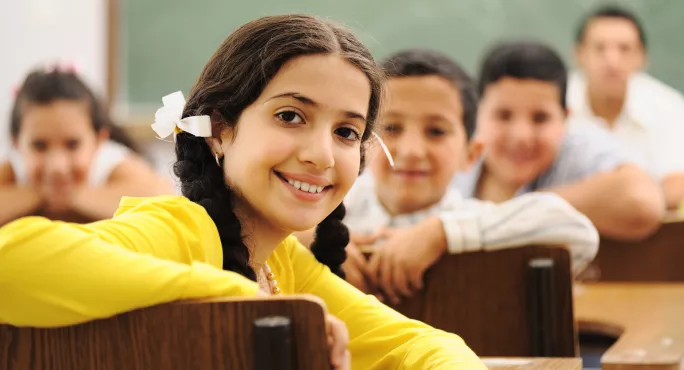What rural Lincolnshire and urban Beirut have in common

At Frances Olive Anderson Primary School (awarded the British Council International School Award on three consecutive occasions) we have struck up an unusual twinning arrangement with Mohammad Shamel State School in the heart of Beirut. Lebanon’s capital city, with its diverse blend of beliefs and ethnicities, offers the perfect juxtaposition for us in rural, monoculture Lincolnshire.
Indeed, it is in direct response to this homogeneity that the staff, pupils and whole school community have worked so hard to enable encounters with their counterparts around the world; our international work is opening new doors for the children.
Our most recent Ofsted report identifies our international work as a major strength of the school, of which the children are exceedingly proud. Our motto is “being different, belonging together”, and this exemplifies the experience the pupils have of their school community, the local community in which they are situated and the global community with which we consistently maintain strong links.
Leading the way
This international partnership has been a truly inspirational experience for the past five years, not just for the school but for the local community and beyond. As our link has had such a profound impact on us, we wanted to encourage other schools to partner with Lebanon and Beirut - so much so over that over the past 18 months we have helped facilitate more than 10 new collaborations between Lincolnshire and Lebanon. This culminated in us leading a group visit to the Middle East, in order to meet and network with all the partner schools.
With the issue of refugees constantly in the news, we felt it was more important than ever to give our students the skills to deal with controversial issues. And what better way of doing this than by speaking to children who have experienced it first-hand? Mohammad Shamel State School hosts a growing number (currently about 400) of Syrian, Palestinian and Iraqi refugees.
Through this project, we are encouraging the students to see refugees not as numbers in need of aid but rather as the people that they are. We are providing our children with tools to take action and not just “admire” a problem.
The pupils enjoy the work because they get to apply what they learn in class in a real-world context; it personalises their learning. As a result of the impact of this on the children in both schools, we were invited to the Supporting Syria conference in London in 2016, where we delivered a Skype session about our collaboration to world leaders. More recently we were invited to Jordan to give a presentation to the Ministry of Education encouraging them to set up partnerships with the UK.
Peer-to-peer learning
We use Skype and FaceTime to link our two countries’ classes virtually. This piece of digital citizenship empowers the pupils to reap the benefits of digital technology in a safe and effective way. When children learn from and copy their peers, it has a bigger impact on them. If they learn directly from their peers in another country, it has an added value as it offers students the opportunity to see their world differently, to appreciate that it is fragile and, most importantly, to speak up when it is at risk.
Many schools worry about fitting the demands of an international partnership into an already overcrowded curriculum. However, at our school, we have used our international work to add depth and value to our curriculum by embedding it in what we do every day. For example, we have used the diverse mix of religions and ethnicities in our partner school to deepen our RE lessons by encouraging the children in both schools to question each other about their beliefs.
An emotional hotline
This partnership doesn’t just benefit the UK pupils; the impact it is having on the children in Lebanon is just tremendous. One teacher from our partner school said that their students were more accepting of all differences because of the work we had done. It broke down barriers and shattered stereotypes that had become more entrenched during the war in Syria. The children felt more comfortable in speaking English.
The Lebanese pupils have learned a lot from their friends in Lincolnshire. That connection has shown them how similar they all are, and taught them that not everything is black and white. The children have become much more relaxed about sharing their feelings, fears, wishes and hopes; we have created a sort of emotional hotline to the UK.
Probably most importantly, the scheme has boosted the children’s self-esteem and confidence and made them realise that it doesn’t matter where anyone comes from, making our own school much more tolerant and inclusive.
At Frances Olive Anderson primary, we have completely embraced the British Council’s vision for every young person in the UK to have an “intercultural and international experience”. We believe it is important to bring the world into classrooms, by building strong and lasting connections with schools around the globe. We believe it is essential for our young people to understand the world around them - and not just to learn about other cultures but to learn alongside them.
Stewart Cook is a Year 5 teacher and international coordinator at Frances Olive Anderson (CofE Aided) Primary School in Lea, Gainsborough
